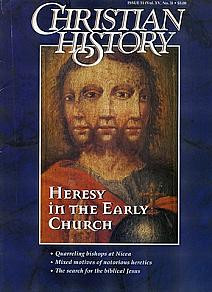LIBERIUS’S MOMENT OF WEAKNESS TROUBLED THE CHURCH

[Liberius—Chevalier Artaud de Montor. Lives and Times of the Popes. New York: Catholic Publication Society of America, 1909. Public domain.]
“ANATHEMA TO THEE, Liberius!” wrote Hilary of Poitiers (died c. 367). Liberius, Bishop of Rome (i.e. pope), had complied with a softened Arian formula and had joined in condemning Athanasius, the chief spokesman of orthodox Christianity. This sent shock waves through the church. Beside Hilary, other leaders of the period mentioned this lapse by Liberius. Among them were Athanasius (died 373), bishop of Alexandria; Bible translator and theologian Jerome (c. 347–420); and Sozomen (died c. 450), a church historian of the following century.
Liberius had become bishop of Rome on this day, 22 May 352. Debates over the nature of Christ troubled the era. The Arians considered Christ less than fully God. Emperor Constantius (317–361) embraced their views and persecuted Orthodox leaders. When Liberius stood against Arianism, the emperor threatened him. The Roman people supported their bishop. Fearing trouble, the emperor’s allies surrounded the city with troops under cover of darkness. They seized the bishop in the middle of the night, spiriting him out of the sleeping city.
The emperor banished Liberius to Thrace (a region in the southern Balkans). Liberius refused money from the emperor, the empress, and a high official—money that would have eased his travel and exile. To the emperor’s messengers he replied, “Go and tell him who sent me this gold to give it to his flatterers and players, who are always in want because of their insatiable cupidity, ever desiring riches and never satisfied. As for us, Christ, Who is in all things like unto the Father, supports us, and gives us all things needful.” His messages to the other two were similar in tone.
Meanwhile, the emperor’s Roman allies consecrated archdeacon Felix as bishop in Liberius’s stead. By this, Felix and his supporters perjured themselves, because they had sworn to stand by Liberius. Felix’s consecration took place in a secular building because the mood of Rome made it dangerous to hold the ceremony in a basilica.
Two years later, Constantius visited Rome. Leading women petitioned for their bishop back. Constantius agreed. But Liberius first had to condemn Athanasius and accept an Arian creed. The once-staunch bishop yielded to bodily threats. Athanasius wrote, “Moreover Liberius, having been banished, after two years gave way, and under fear of threatened death subscribed. But even this proves only [the Arians’] violence, and his hatred of heresy; for he supported me as long as he had free choice.”
Nonetheless his temporary weakness troubled the church. “This apostasy of Liberius sufficed, through the whole of the middle ages, for a proof that Popes could fall into heresy as well as other people,” wrote Janus (a nineteenth-century opponent of papal infallibility). Back in Rome, Liberius returned to orthodoxy. And although Constantius ordered Felix and Liberius to share power, Roman mobs would have none of it. “One God, One Christ, One Bishop,” they chanted. They drove Felix and his followers from the city with bloodshed.
Trouble continued after Liberius’s death (366). A majority of the people and clergy of Rome chose Damasus, a sixty-year-old deacon, to be their next bishop. Three bishops, including the Bishop of Ostia, consecrated him in the traditional way. He was completely legitimate.
However, Damasus had been a follower of the antipope Felix. His election did not sit well with a Roman minority. They chose Ursinus in Liberius’s place and battled Damasus’s followers. This led to fatalities. After the bloodiest of the battles, a three-day affair, one-hundred-and-thirty-seven followers of Ursinus lay dead on a basilica floor. Damasus, the victor, proved sound in his opposition to Arianism.
—Dan Graves
----- ----- -----
For more about the heresies that troubled the early church, consult Christian History #51, Heresy in the Early Church






